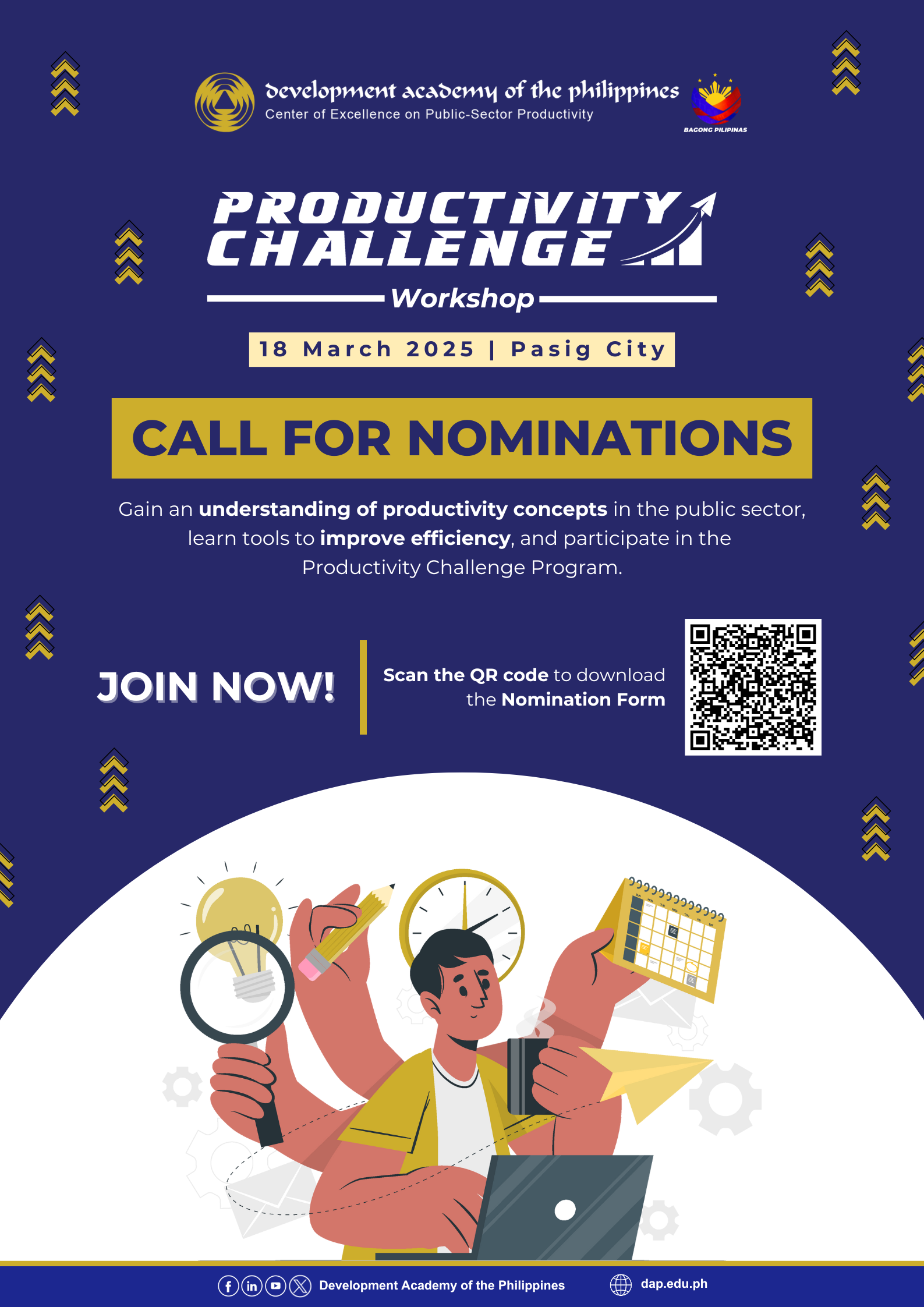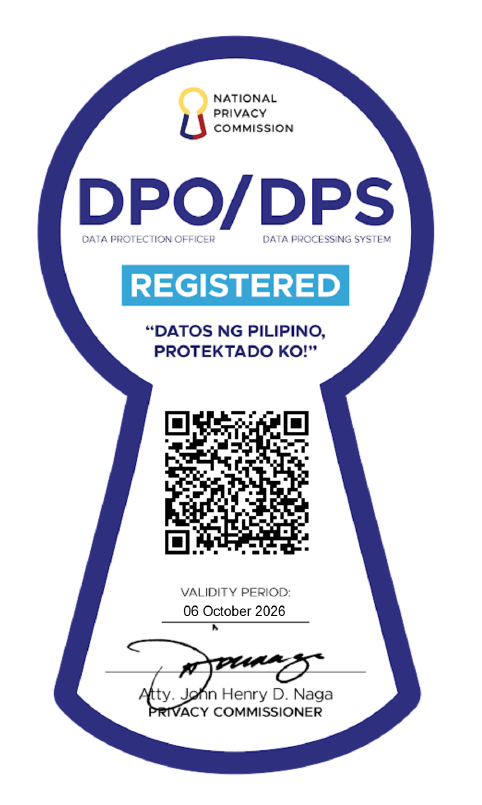
The photo shows (left to right) DAP SVP Magdalena Mendoza and Executive Director of Canada?s Institute for Citizen-Centred Service Dan Batista during the second webinar on “Citizen-centered Frontline Public Service Delivery During and Post-COVID-19 Pandemic” last September 3 via live streaming at the Productivity and Development Center?s YouTube account.
“Building trust and confidence in government is essential for it to be successful in delivering public services,” said Asian Productivity Organization (APO) technical expert and Executive Director of Canada’s Institute for Citizen-Centred Service Dan Batista, during the second of a three-webinar series via YouTube live streaming titled, “Citizen-centered Frontline Public Service Delivery During and Post CoVID-19 Pandemic.”
The event was organized by the Development Academy of the Philippines (DAP) to scale up its support as the National Productivity Organization in helping service managers and frontline staff, especially those from the social and public health sectors, to carry out their duties in these challenging times through sharing of best practices and encouraging collaboration.
Some 555 representatives from national government agencies, line and staff bureaus, state universities and colleges, government-owned and controlled corporations, local government units, and oversight agencies nationwide participated in the webinar and gained appreciation of the preparedness of public service agencies and personnel and explored best practices and approaches on service quality adopted by various levels of the Canadian government.
DAP Senior Vice President for Programs Magdalena L. Mendoza, in her welcome remarks, imparted to the participants that one of the salient goals of the Philippine government is to help create an enabling environment for citizens to prosper and businesses to grow. “With better understanding of what ultimately determines citizen and business satisfaction, we can certainly make transacting with the government a worthwhile and pleasant experience for the public to whom it is mandated to serve,” she said.
Resource Person Dan Batista affirmed that, as the pandemic continues to affect the operations of providing services, Canada is currently at the tipping point in terms of online interactions. Canadians transact predominantly by way of digital means through chatbots and virtual assistance and their interest to communicate through telephone calls is decreasing because of their lower level of satisfaction in that channel. Notably, even with the widespread technological advancement, it is still the employee’s engagement and commitment in providing public services that lead to higher levels of citizen service satisfaction as citizens put their trust and confidence in the government. “If there is a high level of satisfaction with the work they are doing, there is a sense of pride and ownership in being able to come forward with ideas and ways to innovate, improve, and deliver quality services,” he declared.
He emphasized that what the citizens say should be used to shape the services the organizations provide them. “Citizen-centered services must be designed with empathy, respect, thoughtfulness, and an understanding of good design and delivery.” This, he said, are the qualities often perceived as lacking in governments.
Canada’s response to the pandemic mostly comes from the critical role of public education as it increases awareness and provides information on prevention of the COVID-19 disease. “Canada’s response is based on the lessons learned from past-experiences during the Severe Acute Respiratory Syndrome outbreak in 2003,” said Executive Director Batista as he cited some of the notable elements to ensure that Canada would be well prepared to detect and respond to a pandemic outbreak. This includes the creation of the Public Health Agency of Canada, Appointment of a Chief Public Health Officer, and development of the Canadian Pandemic Influenza Preparedness Plan.

DAP PDC-PDRO Director Monica Saliendres presents some of the plans of the government that will significantly contribute to enhanced service delivery under the „new normal.?
Sharing the Philippine’s efforts to improve government services and provide the citizens a better transaction experience, DAP’s Productivity and Development Center (PDC) -Productivity Development Research Office (PDRO) Director Monica Saliendres presented a quick look at the citizen-centered public service before and during COVID-19 Pandemic and what will be public service under the new normal. She cited some of the efforts to improve government services to provide the citizens a better transaction experience, namely, R.A. No. 11032 known as the Ease of Doing Business Act, The Results-Based Performance Management System, Modernizing Government Regulations Program, and the Government Quality Management Program (GQMP).
Director Saliendres also talked about the results of the study conducted by the DAP in 2018 and 2019 to determine the satisfaction of citizen and business and to craft an acceptable set of Service Quality Standards under the project on Institutionalizing Service Quality Standards in Frontline Government Services which showed satisfaction scores of 86.93 and 80.53 for Government to Citizen and Government to Businesses transactions in 2018 and 2019, respectively.
She further mentioned some of the key drivers of Citizen and Business Satisfaction which, when practiced progressively, will contribute to building trust and confidence in government. Some of these key drivers of citizen and business satisfaction are delivered service as promised, updated and useful information, information on regulations and requirements, reasonable fees, no noon break, ease of payment method, length of waiting time at the facility, presence of queuing system, processing time, and helpfulness of the frontline service providers.
As part of the continuing initiative of the DAP under the GQMP, Director Saliendres enjoined the national government agencies and local government units to participate in the DAP’s 2020 Whole-of Government Citizen Satisfaction Survey that will run in November to December 2020.
The session served as the second of a three-webinar series of the Service Quality Talk to help government agencies and frontliners identify and meet the expectations of citizens and businesses in this time of pandemic.
The DAP seeks to empower leaders, strengthen institutions, and build the nation through pioneering, value adding, synergistic ideas, concepts, principles, techniques, and technologies addressing development problems of local, national, and international significance. DAP – PDC offers capability building, technical assistance, and research, related to productivity and quality improvement. For more information, visit www.dap.edu.ph, email pdc.pdro@dap.edu.ph or call 0977-826?3077.
###




